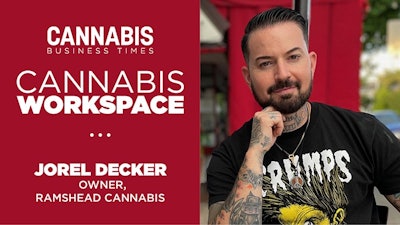
Name: Jorel Decker
Location: Lindsay, Okla.
Title: Owner, Ramshead Cannabis
One word to describe your cultivation style: Hydroponic
Indoor, outdoor, greenhouse or a combination: Indoor
Can you share a bit of your background and how you and your company got to the present day?
When I first decided to start growing in 2013, it was just to make some extra money at the time to pay my rent. I wanted to keep touring with my band, Hollywood Undead, but wasn't able to tour and pay rent. It was a weird time for the music industry. We signed a 360 deal, which completely crippled us financially. But when you're that broke and someone offers you lump sums of money, you don't care about the devil in the details. ... We had to work odd jobs in between tours. Music streaming wasn't popular or a thing yet. Physical sales were not selling anymore, so we weren’t seeing any revenue. I sold my car to make space in the garage, and I needed the money for my first grow setup. I went into a hydro store on Hollywood Boulevard that I was always passing by called Superior Hydroponics. I started asking questions and bought some grow tents and everything I needed for $7,000. I went all in with the car money.
From the moment the first plant touched the coco, I was hooked. I spent all my free time in that garage and was obsessed. Fast forward years later, I moved to a bigger garage, and then warehouses, taking massive leaps of faith in myself, and experienced massive failures. Time and time again, the ups and downs were crazy. More downs than ups. I never stopped even when I should have. Growing consumed me day and night, which it still does to this day. I wanted a chance in the legal market, which wasn't an option in California. I tried but it wasn't a level playing field. When I heard Oklahoma went legal, it was like a second chance. So, we’ve been growing in Oklahoma for over three years now, and it’s been extremely difficult up to this day. The advancement of technology has brought us leaps and bounds in the last few years. Together, with our team, we run and control grows from afar. I can control my small personal grow while I am on tour now by making adjustments and monitoring everything on my phone.
What tool or software in your cultivation space can you not live without?
Aroya is a software we use for all of our scheduling, tracking cultivars, tasks for employees, and more importantly, how we check our environment and feed EC and moisture content in our grow medium. We currently are using TrolMaster to control the environment, Aroya to monitor our environment fluctuations and VPD and EC/moisture content, and Rivulis to control the irrigation on the doser system. It's kind of a mix and match right now from when we first started, with recent upgrades. We work with other people as well, to help monitor and control the facility. We have a lot of eyes on it at all times from all over the world.
What purchase of $100 or less has most positively impacted your business in the last six months?
I would strongly recommend SensorPush tech or a Pulse environment monitor for temp/humidity. Your VPD is one of the most important things in your grow room that beginners overlook. These little sensors track that data and give charts so you can see fluctuations. Most people leave their rooms for eight to 10 hours at a time and have no idea what is going on when they're not there. I’ve seen rooms get down to 65 degrees the first few weeks of flower and the grower has no idea. This is bad, until they add a sensor and see what the room is doing 24/7. SensorPush has amazing charts that help you see what the room is doing at all times.
What cultivation technique are you most interested in right now, and what are you actively studying (the most)?
Crop steering is the hot topic these days, and where cannabis is and will continue to go. If you're not crop steering already, then you are falling behind. I definitely wasn't the first to the table with that. But I started learning it sooner than most.
Most growers told me to not even bother and to keep it simple. I tried it for a year on my own and had so many failed harvests. I spent tons of time and money trying to figure it out. There are a lot of specific watering methods and cues and different environment changes. It’s basically un-training your brain and starting over. At the time, it was still a mystery and there wasn't much info on it. It was more trial and error then anything for me. I wanted to know why some of my harvests were great and some weren't, even though [I was growing] the same strains [in the same] room.
It turns out I was missing key elements like letting plants get too big in veg. Crop steering works so well, my plants were getting 4 feet tall in four weeks, then massive in bloom. I wasn’t used to seeing explosive growth and didn’t know how to control it. Even though I was failing constantly, my thirst for knowledge and desire to figure it out led me to some of the best growers in the world, people who brought crop steering to the masses, people such as Ramsey Nubani and Josh Neulinger, who I am working with currently.
How has a failure, or apparent failure, set you up for later success? Do you have a “favorite failure” of yours?
In the world of growing, experience is everything. You can read 1,000 textbooks and watch 1,000 YouTube videos, but when a pump breaks and your plants have to be fed ASAP, you better know how to open that pump up and fix it. I’ve grown in so many situations, many less-ideal ones, and learned the hard way through hands-on experience. It taught me framing, plumbing, electrical, HVAC, you name it. I can fix most grow equipment on the fly.
My favorite failure was when I started. I had a whole room die due to turning an AC off to spray and left the room without turning it back on. The lights kicked on and I wasn’t there. The room died in the middle of a cycle from extreme heat. I walked in the room and thought I witnessed a murder scene at 150 degrees. That one hurt. This was before the technology that growers have available now. So, I bought an AcuRite environment sensor, which was one of the only [sensors available] at the time, made it email me notifications, then found some random third-party app that would make my phone go crazy when it got an email from anywhere. So, I had to create a specific email for that and jump through hoops to create push notifications that didn't exist at the time for temp/humidity. If it did, nobody I knew, knew anything about it. Growing was very hush hush back then. That work, I figured out, saved me so many times. Now new growers have it at their fingertips.
What advice would you give to a smart, driven grower about to enter the legal, regulated industry? What advice should they ignore?
This is such a loaded question, and there are so many ways to answer. Be ready to get stepped on and be ready to work harder than ever before. If this is where you truly want to be in life, you need to dedicate your life to it. You’re dealing with investors and money people who are going to tell you how to grow a plant, even though they never have. Ignore the advice that you're going to get rich quick or rich at all. With [the] legal [industry] comes taxes and regulations and a lot of competition. Do it because you love it, not for money. It won't work out in the end if you aren't obsessed with growing. The first day I walked into a hyrdo store almost 10 years ago, a salesman told me, "If you're going to grow, you’re going to experience a lot of failures; don’t have a heavy heart." Words I carry with me to this day.
How do you deal with burnout?
It’s tough. I want to quit all the time. But I’ve wanted to quit my successful band many times. Growing has become a real job at this point. I used to be able to be alone with the plants and ignore the world. But the natural progression of growth is bigger places, more employees, more paperwork. I’m fortunate to work with friends, but it’s still a job. What keeps my passion going is having a small personal grow for fun where there’s no pressure, because at night I’m still reading grow materials and talking to friends about growing. It’s a passion and obsession I couldn’t quit even if I tried. Just like my band, I make music outside the band that’s just for me and that keeps me grounded.
How do you motivate your employees/team?
I’m not with them 24/7 because I have to be in so many places at once. But when I am, I’m right there working with them. I’ve had every job you can possibly think of in the cannabis field. I was self employed the whole time, but I did it all and all at once, so I understand it all. Nothing is below me. I worked for free alongside them for three years building the company. I personally treat them how I’d like to be treated, I think that speaks miles for every aspect in life and motivates people. Be a leader, not a boss.
What keeps you awake at night?
I guess you could call it fear of failure. But I'm not afraid to throw in the towel and admit to myself and the world that it didn’t work. I created a magazine before growing and dedicated my life to it—designed it, took photos, wrote, printed mass issues overseas, distributed it, all with one friend. It was one of the hardest things I've ever done. I killed myself and even though we came out with three issues, it failed. I was OK with that. I learned so much and what not to do in the future regarding business.
The fear of losing everything that I have worked for and not being able to provide for my family haunts me. This is a phobia, an unfounded fear. I was happiest in life when I was poor. Sometimes as humans, we tend to keep reaching for more, and start acquiring things we don’t need. I’m guilty of that as well. The higher you dream, the lower you can fall.
What helps you sleep at night?
Weed, duh!
Editor’s note: This interview has been edited for style, length and clarity.


























